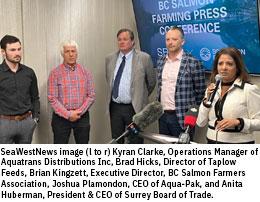Surrey reels from salmon farm closures

By SeaWestNews
The Surrey Board of Trade is calling on Federal Fisheries Minister Joyce Murray to rein in her plans to shut down salmon farms in British Columbia and instead come up with a pathway that will preserve Indigenous rights, protect aquaculture jobs and promote the Blue Economy.
Murray, who is ideologically opposed to open-net aquaculture is working on a transition plan for salmon farming in BC, that will impact more than 4,700 jobs and $1.2 billion in economic activity annually.
She was expected to present the transition options, including the closure of more salmon farms to the Federal Cabinet this month, but has now delayed that decision till the fall.
“…We are extending consultation on the open-net pen aquaculture transition to all interested parties through the summer,” the minister’s office said in an emailed statement to SeaWestNews after a media conference organized by the Surrey Board of Trade (SBOT).
Surrey is the hub of salmon farming in Metro Vancouver, home to numerous operations in salmon feed milling, fish processing, trucking, packaging, and the provision of goods and services, and is already experiencing negative impacts due to the already 40 percent reduction in salmon farming production since 2020, said SBOT.
“We have seen the impacts the closures have had on our businesses in Surrey,” said Anita Huberman, President & CEO of SBOT.
“Last year Mowi Canada West permanently closed their fish processing plant, which resulted in the loss of 80 direct jobs locally, and this isn’t the only example. There still has been no government action to support these workers,” she said.
“Any further closures of salmon farms will mean the removal of the entire salmon farming sector in BC. The closure of salmon farms does not only impact producing companies but many local businesses on Vancouver Island and the Lower Mainland as the sector is interconnected, with an extensive supply chain.”
Surrey is set to lose 344 jobs, $220 million in annual revenue, $46 million in GDP and $24 million in annual salaries stated an independent economic analysis of the potential closures.
“We are calling on the federal government to bring a more rational approach to the transition plan and include other Ministers in providing leadership to developing a reasonable path forward,” said Brian Kingzett, Executive Director, of BC Salmon Farmers Association.
Brad Hicks, Director of Taplow Feeds, who has been involved with aquaculture for four decades, accused Minister Murray of propagating the false assumption that removing salmon farms will increase the number of wild salmon.
“There is no scientific or other evidence to support her thesis that wild salmon will increase by the removal of salmon farms…the human suffering brought on by shutting down these farms will be devastating.”
Hicks said Murray is using the “precautionary approach” as a blunt political instrument to bludgeon coastal communities in British Columbia.
“It is unfounded. It is callous, it is uncaring, and it will not end well.”
Kyran Clarke, Operations Manager of Aquatrans Distributions Inc. a Canadian leader when it comes to the transportation of seafood, said thousands of young people risk losing their jobs with the closure of salmon farms.
“On my team alone there are 11 other individuals under the age of 30, who are all in jeopardy now of having their careers and their futures erased because of the government,” he said.
“So, we’re asking on behalf of our families, our employees and the thousands of others who are impacted…stop the further closure of salmon farms.”
Meanwhile, the United Steelworkers Local 1-1937 hosted a rally last week to support the BC salmon farming sector in Campbell River.
The event was organized to support union members who work at a fish processing facility in Port Hardy, BC, whose jobs are now at risk.
Government decisions have shut down 40% of salmon farms in B.C. since 2020, making groceries more expensive for Canadian families, increasing carbon emissions and wiping out jobs that are the lifeblood of rural, coastal and Indigenous communities, said the Canadian Aquaculture Industry Alliance (CAIA).
Canada’s aquaculture industry generates $3.86 billion in economic activity; employs over 14,500 Canadians and provides 1/3 of the total value of Canada’s fisheries production.
It is the fourth-largest producer of farmed salmon in the world with 97 percent of salmon produced in Canada being farm-raised, which is key to reducing pressure on limited wild stocks.
But the production levels have stagnated despite a wealth of science and innovation in the industry that shows both wild and farmed can thrive in BC waters.
Meanwhile Asia, especially China, now accounts for more than 90 percent of global aquatic animal production. The Americas, Europe and Africa combined account for 8.2 percent.
Highlighting the fact that seafood farming on average produces fewer greenhouse gas emissions than other forms of animal production, the United Nations has released eight articles discussing critical themes for aquaculture, including production methods, social issues and planetary health, nutrition, genetic resources, biosecurity, governance, and inclusive market access.
Key messages include the need for climate-smart solutions to use the ocean more effectively, efficiently and intelligently to supply food and the development of more efficient farmed types of aquatic species.









